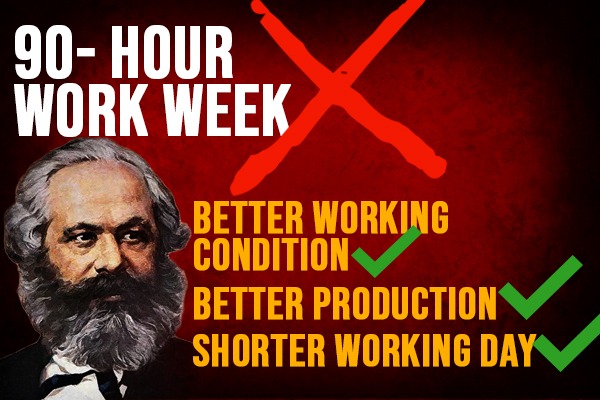The recent remarks by S.N. Subrahmanyan, Chairman and Managing Director of Larsen & Toubro advocating a 90-hour workweek are not an isolated incident but a symptom of a deeper systemic issue inherent in capitalist societies. Recent statements by Narayan Murthy and other similar remarks by high-profile executives, reveal a troubling mindset among capitalists that prioritizes profits over people. These comments not only disregard the well-being of workers but also highlight a disregard for the historical struggles that secured humane working conditions.
This is not just about one off remark, it reflects the structural exploitation embedded in modern corporate culture. By pushing for longer work hours, capitalists aim to extract maximum surplus from labor, perpetuating inequality and alienation. The call for a 90-hour workweek in particular, undermines decades of progress achieved by labor movements and poses a significant threat to both individual well being and societal stability. It is a stark reminder of the urgent need to challenge the exploitative tendencies of capitalism and reimagine a system that values human life over corporate greed.
The call for extended working hours strikes at the heart of a long-standing struggle for humane labor conditions. The eight hour workday, a milestone in labor history, was not granted voluntarily by employers. It was achieved through collective action, protests and in some cases, violent confrontations. Events such as the Haymarket Affair in 1886 and the protests led by Indian labor unions during the early 20th century stand as reminders of the sacrifices made by workers for this basic right.
These efforts were rooted in the principle that workers are not machines. They deserve time to rest, recharge and participate in society beyond their workplaces. Suggesting a 90-hour workweek not only disrespects these hard-won rights but also risks reversing the progress that has been made towards ensuring work-life balance.
The drive for longer working hours reflects a profit centric mindset that sees workers as tools rather than individuals. Human beings are not commodities to be expended until their utility is exhausted. The objective of production should be to create value for society while enabling individuals to lead fulfilling lives. This balance is crucial for the long term sustainability of any economic system.
Corporations often argue that extended work hours boost productivity. However, numerous studies have debunked this myth. Prolonged working hours lead to burnout, decreased efficiency and higher rates of errors. In fact, workers who are well rested and maintain a healthy work-life balance are more productive and innovative.
One of the greatest contradictions of modern capitalism is the failure to translate technological advancements into better working conditions for employees. Automation, artificial intelligence and other innovations have significantly increased productivity. Technological advancement in capitalist production is done only through the surplus obtained by appropriating labor. Yet the benefits are rarely shared equitably with workers.
Technology has the potential to reduce the burden on workers, allowing them to work fewer hours without sacrificing production. Earlier economists predicted that technological progress would lead to shorter workweeks and more leisure time. Instead, these gains have been monopolized by corporations and used to exploit the workers even more.

Shorter work hours, made possible by technological advancements would not only improve the quality of life for workers but also address issues like unemployment. By redistributing labor across a broader workforce, companies could reduce joblessness while maintaining productivity. This redistribution would increase purchasing power and drive economic growth.
The concentration of work among fewer individuals creates significant economic and societal challenges. By overburdening a small segment of the workforce, companies reduce the need to hire additional workers and/or fire the extra workforce, leading to widespread unemployment. This not only destabilizes the economy but also has profound social implications.
Unemployment affects more than just individual livelihoods, it destabilizes communities. Jobless individuals often experience a loss of purpose and identity, making them vulnerable to destructive behaviors such as addiction and crime. Studies have shown that regions with high unemployment rates also experience a rise in theft, violence and other forms of criminal activities as people struggle to meet basic needs or cope with the despair of joblessness.
Moreover, unemployed youth, feeling alienated and disillusioned, are particularly susceptible to the lure of fundamentalist ideologies. Without meaningful opportunities, they become easy targets for extremist groups that exploit their frustration, promising a sense of belonging and purpose. This poses a serious threat to social harmony as it fuels divisions.
With fewer individuals earning wages, overall purchasing power declines, reducing demand for goods and services. This leads to a vicious cycle where businesses suffer, further shrinking the job market. The resulting stagnation deepens inequality, as wealth becomes concentrated in the hands of a few while the majority struggles to survive. This is one of the principal reasons of the increasing economic disparity. In 2022, the top 1% of Indians earned 22.6% of the national income, while the bottom 50% earned mere 15%.
Addressing unemployment through fairer distribution of work hours is not just an economic necessity but a societal imperative. A more inclusive workforce would reduce the risks of social unrest over irrelevant issues, strengthen community bonds and create a stable foundation for long term economic, social, political and cultural development.
The human cost of overwork cannot be overstated. Prolonged hours lead to chronic stress, anxiety and other mental health issues. Workers who spend excessive time at their jobs often struggle to maintain relationships, care for their families or participate in community activities. This erosion of social bonds weakens the fabric of society, as individuals become isolated and disconnected. Children of overworked parents, for instance, often suffer from a lack of guidance and emotional support. Communities lose volunteers and leaders who would otherwise contribute to local initiatives. The cultural and social losses associated with overwork are incalculable, affecting generations to come.
The concept of work itself needs revaluation in light of these developments. The purpose of work should shift from mere survival to enhancing quality of life. This requires redefining productivity to include not just economic outputs but also well being and societal contributions.
In countries like Finland and Iceland, experiments with reduced workweeks have shown promising results. Workers report higher satisfaction, improved health and greater efficiency, while companies experience sustained or even increased productivity. These examples challenge the notion that long hours are necessary for economic success.
The response to proposals like a 90-hour workweek must be more than just criticism. It must be a call to change the very foundation of the current social order. The capitalist system which prioritizes profits for a privileged few at the expense of the majority has proven time and again to be exploitative and unsustainable. Socialism offers the only viable path forward, a system that prioritizes the well-being of the majority over the accumulation of wealth by a few. A system that produces not for profits for the few but for consumption by all.
Trade unions and labor organizations are critical in resisting such regressive measures. However, their fight must extend beyond individual policies to addressing the structural inequities of capitalism itself. Governments must also rise to the occasion not just by enacting labor laws but by embracing policies that ensure the equitable distribution of resources and prioritize the collective good over corporate interests.
Most importantly, workers must recognize their immense collective power. It is only through unity and organized action that they can dismantle the exploitative structures of capitalism and lay the foundation for a new order. Workers must strive for a society that redistributes wealth, ensures humane working conditions and uses technological advancements to improve lives rather than intensify exploitation.
S.N. Subrahmanyan’s statement advocating a 90-hour workweek is not merely a misguided remark but a reflection of the exploitative ethos of capitalism. It disregards the sacrifices of workers who fought for humane working conditions, ignores the potential of technological progress to liberate labor and society as a whole and perpetuates a system that undermines the dignity of work.
The purpose of work must go beyond maximizing profits for a select few, it should contribute to building a thriving, equitable society. A socialist framework, rooted in the principles of justice and solidarity, is the only path to achieving this vision. By reducing working hours, redistributing labor and ensuring the well-being of all, we can create a world that serves humanity rather than exploiting it.
The fight for workers’ rights is far from over. The 21st century demands a new vision. One that prioritizes the quality of life for all and moves beyond the narrow metrics of profit. Workers must unite, not just to resist exploitation but to reimagine and rebuild society itself. Only through collective action and a commitment to socialism we can create a future that truly values the well-being of the majority.








